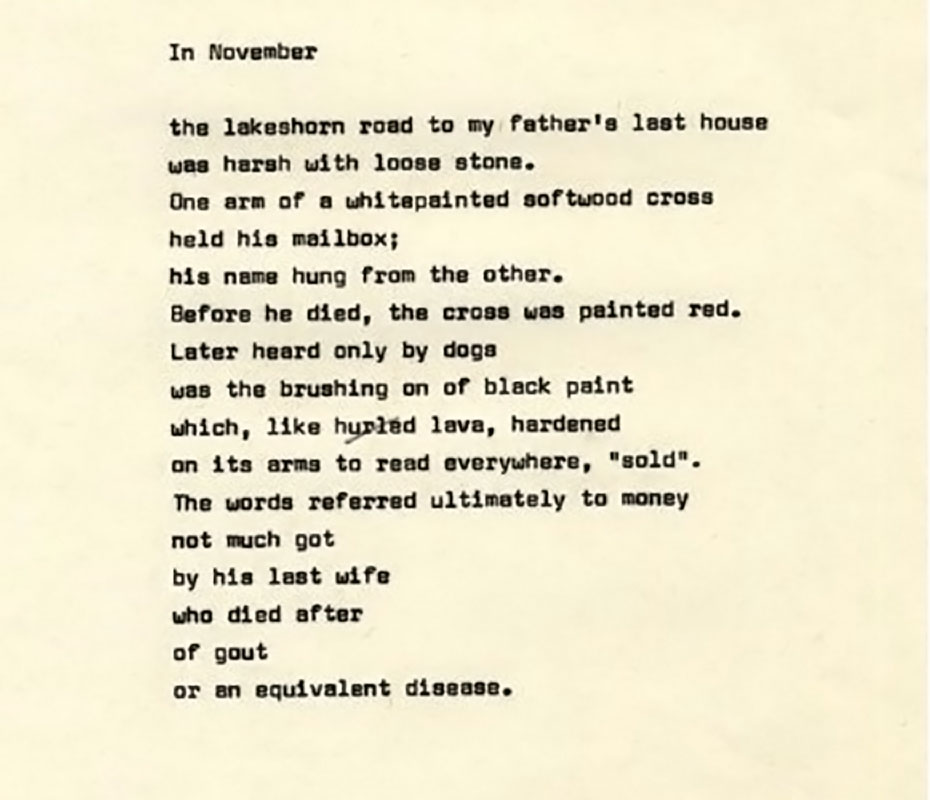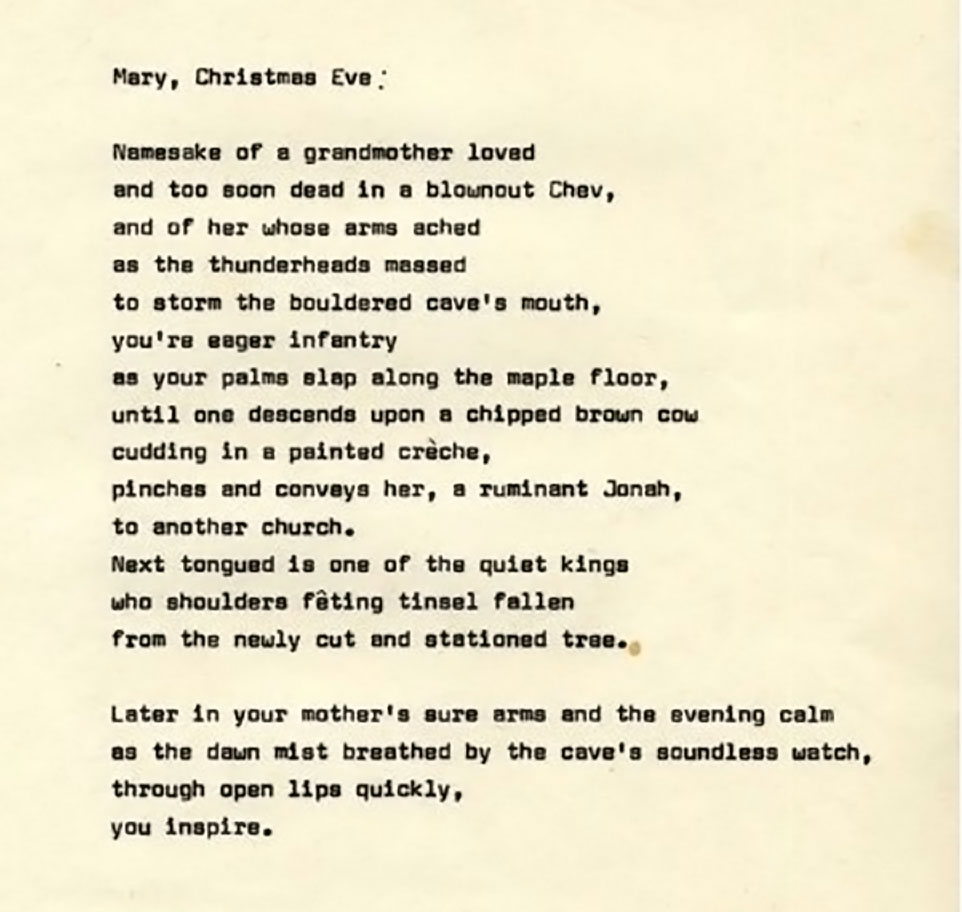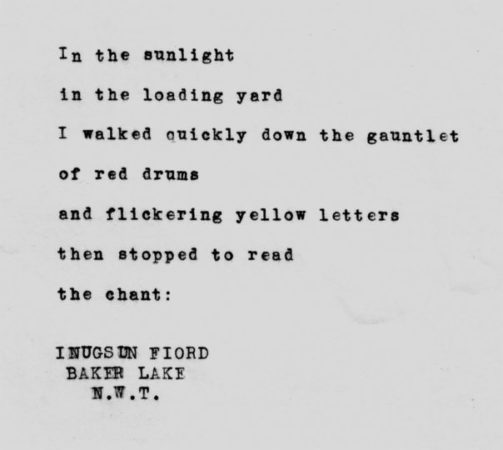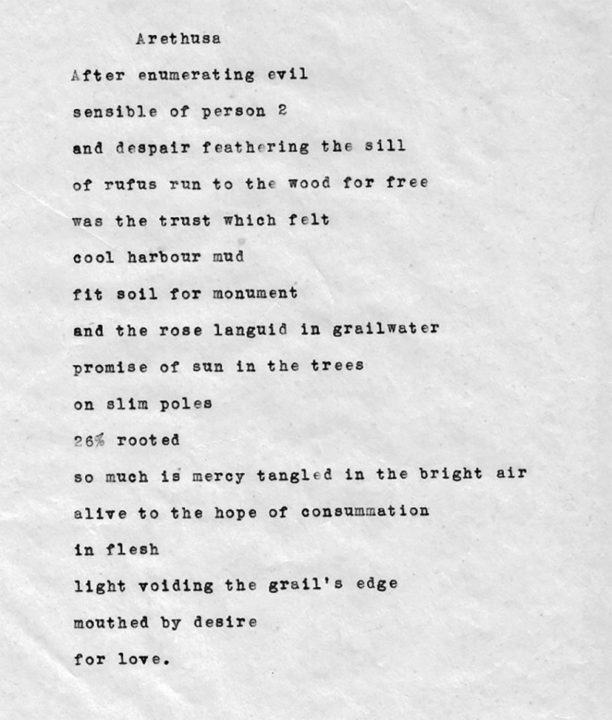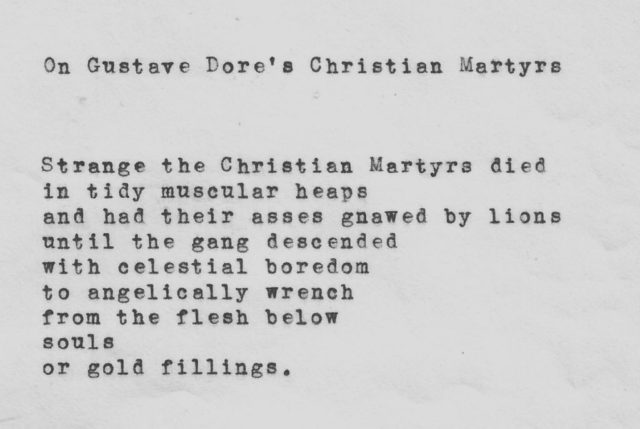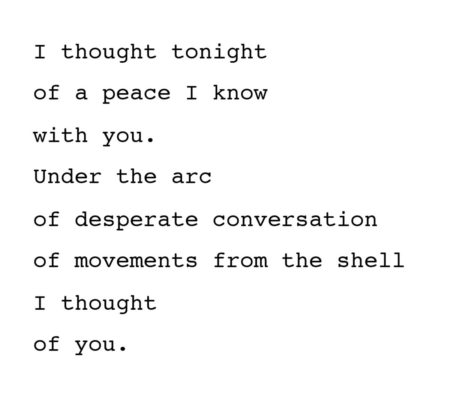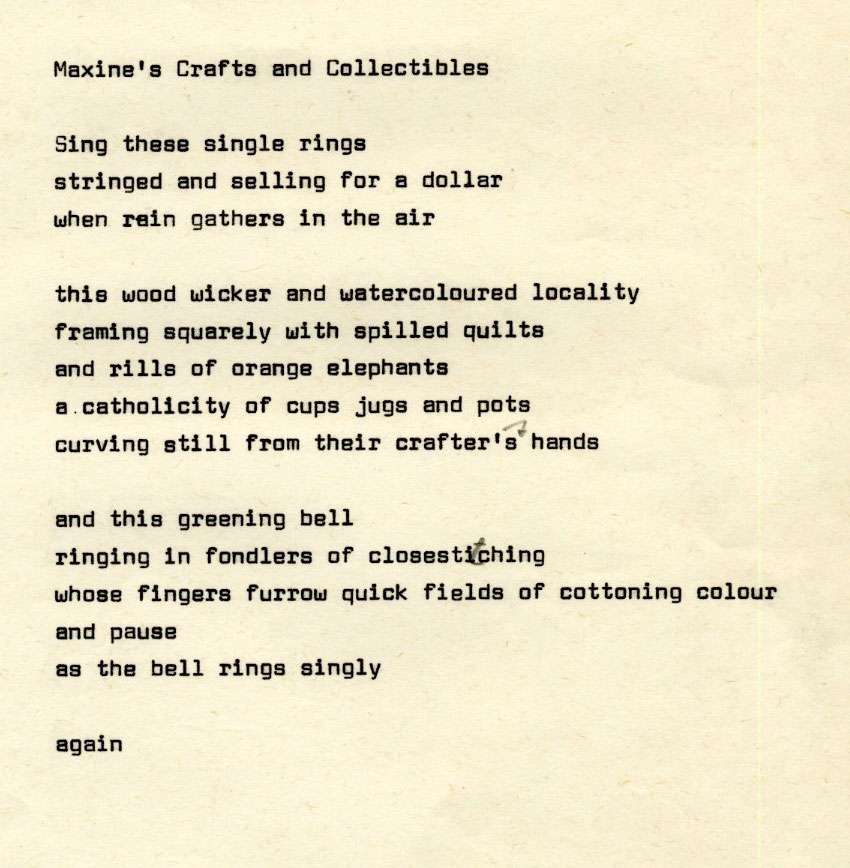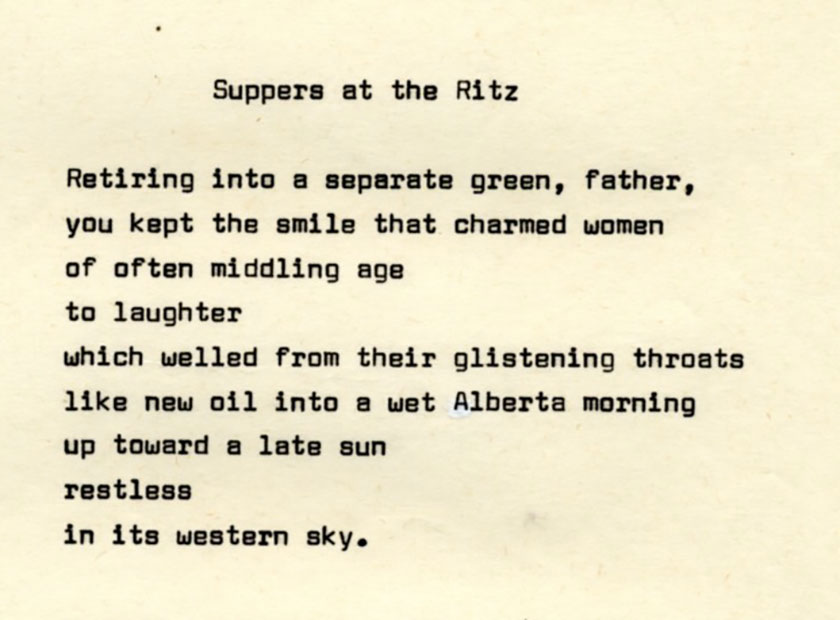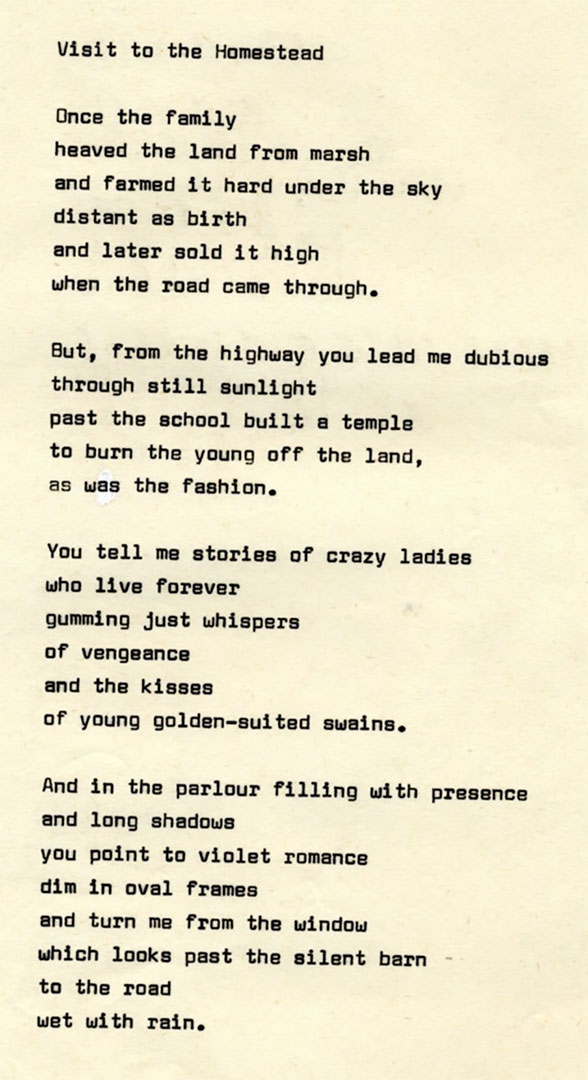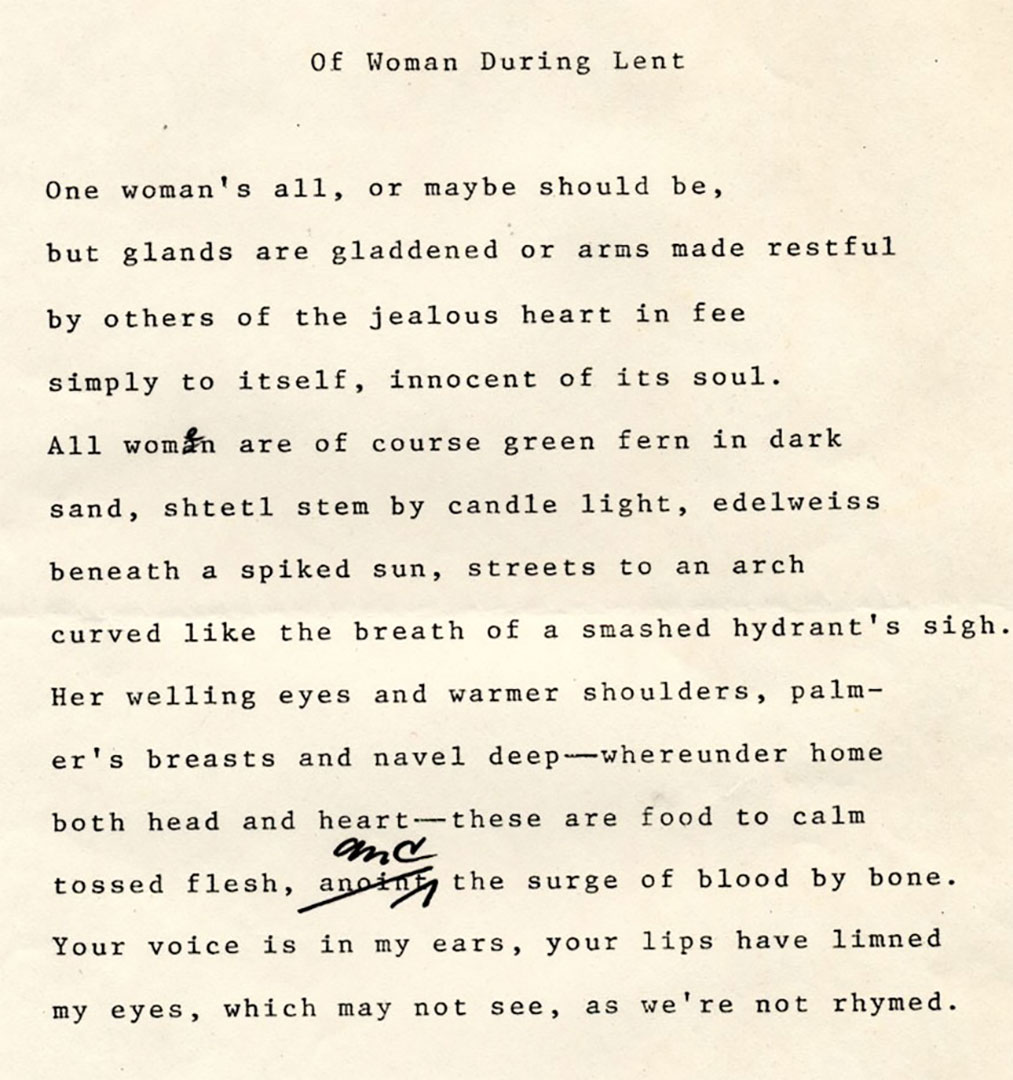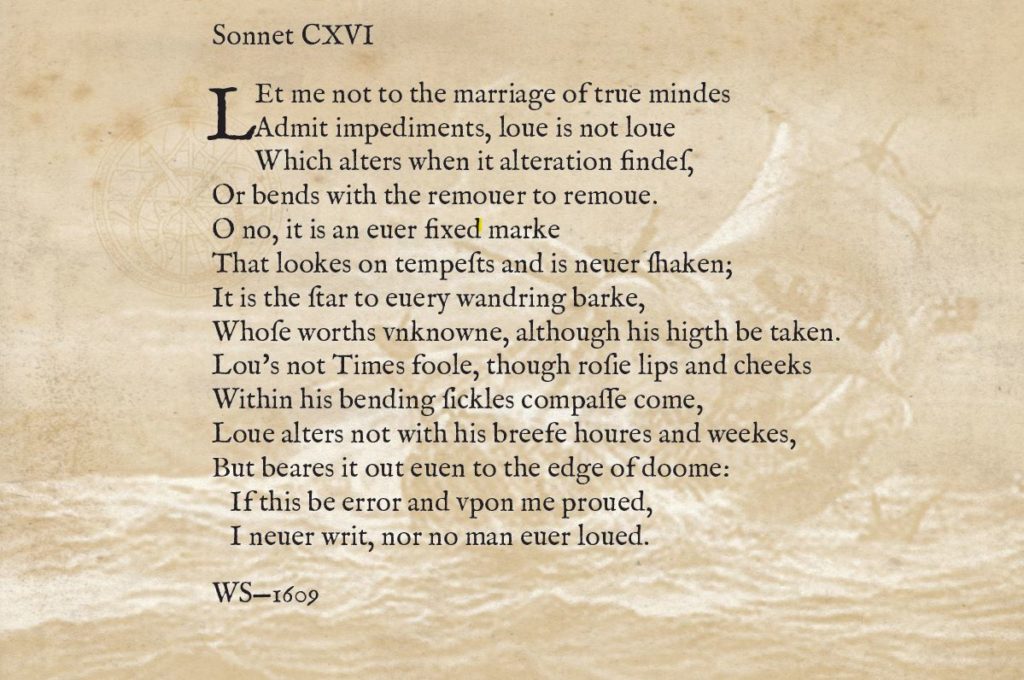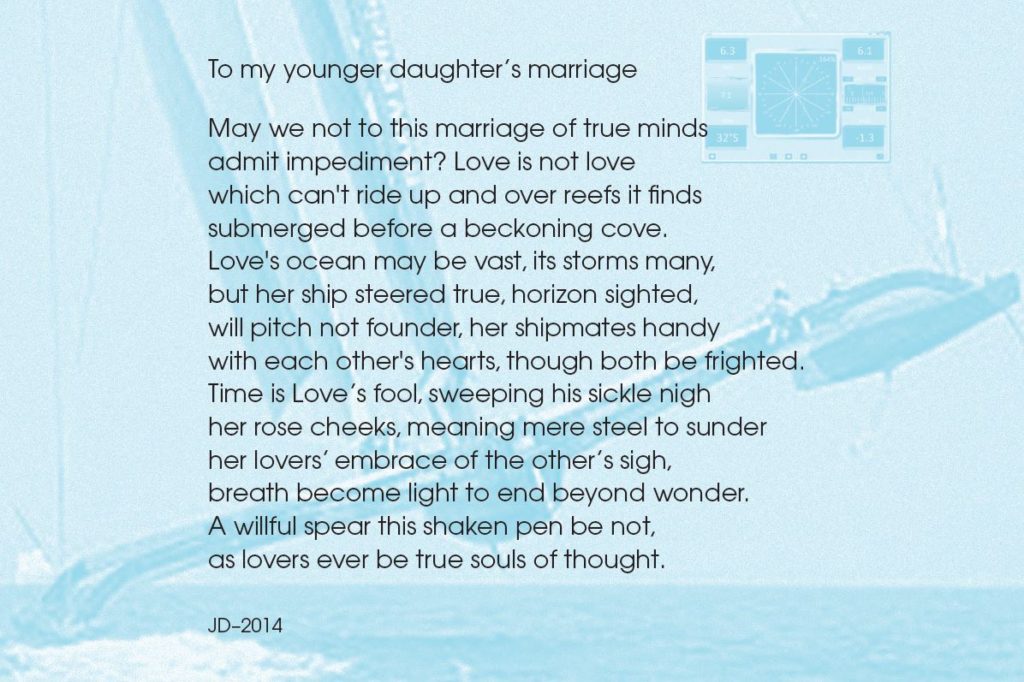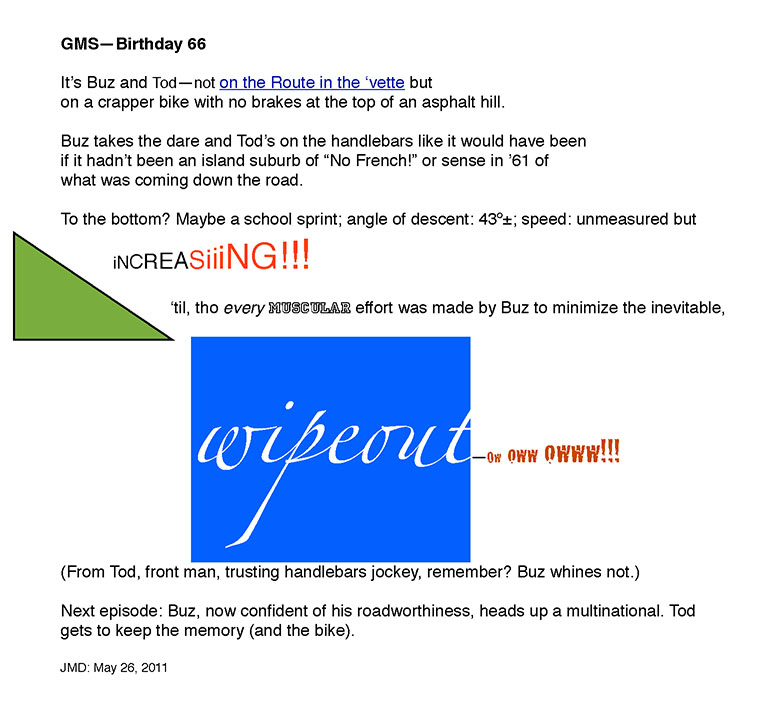My dad and I did a lot of fishing.
Later Still
My dad, my brother, Mike, and I spent a lot of time fishing Ontario lakes from small boats powered by Johnson 5.5 to 15 (!) HP engines. My dad, a champion tennis player when young, could reel cast farther and more elegantly than I ever learned to. What I chiefly learned from fishing with my dad is how much silence should be valued. And, that love often needs few or no words to be understood.
Earlier
Earlier
The poems here were written in my early 20s.
One of the best teachers I ever had (including Northrop Frye and Marshall McLuhan) was David McKeen, DLitt (Oxon) who was a wonderfully learned and generous man.
He wrote me in 1970, of the first poem of those below. “[This] is a real triumph, by far your best […] it states directly what is implicit in the fact that you write such verbally subtle poetry as you do.” This poem was one of a group of 15 I submitted to Prof. McKeen. He liked four. The first three following are of those four.
Prof. McKeen’s was the first praise I received for my poetry.
What’s below are scanned from typescript pages made on an early 20th C. Royal and, later, on a 1972 Olympia. The Royal was a stubborn beast formerly owned by a Col. of the garrison of Quebec City, and it shared with him, I’ve always believed, some of his upright heft. I never liked the squareness of the Olympia’s typeface, but it’s price ($150.) and newness sold it to me in ’72. Why not re-key/type the poems? They wouldn’t be the same.
In November
Mary, Christmas Eve
Chant
Arethusa
On Gustav Dore’s Christian Martyrs
I thought of you
Intro to Maxine
What brio she had! To be a go her craft shop needed more customer traffic than could be expected even of the later 1970s in what was then a village in southwestern Ontario. But it had no shortage of stuff, and of her open-hearted bubbling person, her lovely eyes, her laughter.
Maxine’s Crafts and Collectibles
Intro to Suppers
My dad, having no father to speak of, was raised by his mother and maiden aunts, who gave him drive enough to work his way through McGill in the 1920s and become a combustion engineer, and the good manners and formal anxieties of his class and time. He was a handsome young man when Montréal’s Ritz-Carleton was a rising young hotel. He later worked for big oil in western Canada.
Suppers at the Ritz
Intro to Visit…
My wife Terri’s maternal roots go deep in the rich farmland north of Toronto. Her beloved “Granny” had a house in Bradford where she often nurtured Terri after her mother died when she was 11. I never saw the inside of the house but Terri’s telling of its and related family lore ignited my imagination.
Visit to the Homestead
Of Woman During Lent
Later – When Alice was a baby
Later
When Alice was a baby in her carriage I took her one day to see an older lady living near us in (old) North Toronto who had been part of Greenwich Village life in the later 40s. As she bent to pick up Alice, Alice smiled. The lady said, “This child smiles with her whole being!”
Alice, Sixteen, Smiles
Alice, Sixteen, Smiles
Wider than her several suns—
at rest on clay rays, distracted,
than one and many-planed stars on drywall—
than her early aureole,
each Hendrix hair ironed,
impressed on captured paper,
is her smile.
Glass and leaded straining of its light
through sombre trees—a carousel on fired pots—
cannot dim it.
Alice smiles and favoured kingdoms
leave war’s raging discontent its broken streets,
join hands, beat drums, sing long
of this smile and those to come,
and all waters rush here,
leaving moons to their quiet dust,
and the light of suns everywhere is tributary
to its radiant celebration
this September day.
JMD: 06.09.96/ed. 06.09.2016
To Terri on her 50th
To Terri on Her 50th Birthday
(poem in progress)
here is the electoral map of Notre-Dame-de-l’Ile-Perrot
its acid bars sunlight through the slats of the adirondack chair we shared picnicking in March
you in sealskin I in suede neither then endangered
a champagne splash on a chair arm
clouding in the cold
sketching the window onto Atwater’s ascension of the mountain
from which had we climbed it
could Toronto have been seen
or the square sisaled balcony where
we first showed darling Mary to the nestling sky
sweet unrainy
when came we to still our house then expanse now small
a playhouse of boards much trod its bills little changed
until from your determination
her own light
Alice
passages of nannies friends constant and tried
and family ah family
decades of tended grass spilt wine hard words
and soft
dog and cat we loving embrace our lovely daughters
your daughters T your face quickened lit
beholding them
To My Father at Fifty
To My Father at Fifty
We are driving fast over prairie in a protoMustang
north to a conifer bush to cut the Christmas tree,
my father, and brother and sister,
and I.
My breath is short
as the prairie day—
the light—dazzling.
My brother and I fight over the axe, by turns hack.
Smoking a Sportsman, his boots laced to his knees, Dad carries Pam.
He’s as tall as the trees.
That summer we tour the Imperial refinery—all it makes, he sells. As the late evening sun lights its oil storage,
he remarks that the sunset’s red light on the white tanks
is lovely
and his wide smile proves it so.
J.M.D: 02.09.95
Intro to Pond at Wegmar
The word “Wegmar” is a meaningful amalgam of three initials and an ambiguous abbreviation of the sources financial and spiritual of our cottage of the same name in Prince Edward County, Ontario. The pond is one begun the summer of 1991 by our beloved daughter Alice, who has ever since been its firm-lipped directrice.
Pond at Wegmar
Pond at Wegmar
Alice this year enlarged her pond,
and another smaller, higher dug.
Between them Lesseps a feeding stream
(when the hose is on).
New four mil reclines along, within the sand,
and goldfish of aquarium airs
are poured among the old pond
overwinterers.
There’s roil and ending before the croakers come to blend
to the sheens of summer light.
Paling thyme and ivy, zinnias and the kerria bush
are fullest in the longer shadows,
measures of the restless lake.
Board and straw now shelter fish and frogs
for whom this year are exits added.
December, and the Muslim moon is high.
Below, teal throws upon the nearing cedar
are weft with brightly from the house,
where Wenceslas, God and sinner
(as in us sing)
may round and gracing meet.
E.J.J. is 80 intro
My widely esteemed father-in-law, Edmund Joseph John Walters, Q.C., was (he died in 2015) a tough fiercely ambitious Parkdale Polish kid who become the astonishingly hardworking and, eventually, wealthy senior partner of an old West End Toronto law firm. He could also play Chopin on his various pianos with an intensity that might have distressed but would more likely have pleased the composer.
After 40 years at law Ed retired for another 30 to a large house he built and maintained with his own hands on a hill just east of Malaga. He seldom allowed himself to enjoy the exhilarating view he had of the port and bay of that ancient city, though I did see him once take a half day off to contemplate it on a New Year’s day he was nearing 90.
When 75 (the summer of ’91) and with us at Wegmar, he fenced two decks here with 36 + ’ of rail and 168 balusters, power sawing each vertical member to length and hand sawing and chiselling out space for each in the deck planking, built an eight-tread set of stairs, and installed a four-drawer, 15-cupboard kitchen he’d designed and built in his cramped Toronto furnace room workshop and transported in the trunk of his ’67 Eldorado, together with his circa 1950 table saw (a Sutton Tool & Die [Brantford] 8″ tilt-able, mounted on a homemade plywood box frame fastened to Beaver Power Tools [Guelph] steel legs and powered by a Teco/Eatons of Canada 1/2 HP electric motor).
It must be said this work did take him nearly a week of 10-hour days, and saw him briefly hospitalized for what was first thought to be a heart attack but was soon diagnosed as just pericarditis, the result of too much use of a 20 oz Estwing curved claw hammer (with “laminated leather grip”) I gave him, which he returned to me in his later 80s as then, finally, “a bit heavy” for him.
We afterward inherited from Ed a cut tin Portuguese rooster with green glass eyes, and one of two handmade white-on-black arrow signs which, nailed to roadside trees, used to indicate the Avon Bay, Muskoka cottage he built, improved and maintained for more than 30 years with his own hands but sold when family no longer wanted or could afford to use it.
After my dad died when I was 27, Ed was for me over 40 years an often if not continuously admirable and emulable father figure. I will always be grateful to and honour him.
E.J.J. is 80
E.J.J. is 80
this autumn
sun floods across miles of great lake to fill the eye, and in the air are scents
like those along the ancient coast
an ocean east of here,
where high ensconced another eye may blink
and sweep the harbour of imperial ships
while breathing green
in a low-walled garden,
or
under the house at the heat pump
(whistling and bluing the air by turns)
lips may firm
and the string hammock sway empty,
light through its net casting
onto the tough blade grass below,
while here
in yet another county named for feckless royalty
shadows long toward this platoon of balusters
trained up one by one several summers ago,
and the house they serve (from his energy born)
honours him with emulative work
and remembers him with plaque and sign—
“E.J.J. Walters shaved here” and
“WALTERS,” an arrow in white on black,
the first beneath a mirror to loved faces,
the other guarded by a litigant rooster,
his one green eye glass to the young maple
by a corner of the churchyard fence,
its leaves shimmering through all golds radiant
in the westering light
wise as stars in a further heaven
welcoming all to the festive table.
Papa
Papa
To this extent,
Dad, forgive my long pause at
“It’s cancer, John.”
And your good cheer
thereafter,
for now the kingdom I serve
loves vowels, knows the endings of names
and the price of all things,
the costs of courage, betrayal, ordinary cowardice
longing,
slight ease in the afternoon,
the evening’s step
to dream,
the age of ending,
father,
my father.
Summer—1982-1998
Summer—1982-1998
Her season with us longer
than some dated in the burying ground
up the hill,
our good dog! good girl!
weaves among the melting stones
bent from older grief,
her restless nose leading fall breezes
through the hair along her spine,
as she walks us home.
Where now
she is absence—
empty bowls, bed, back seat, streets,
parks, sand road, winter beach—
Where now
she still races—
sounding joy annoyance warning—
down the stairs along the hall the dock,
and springs at dimming shapes,
is caught up by arms
beyond our ken.
Wegmar, Late Summer
Wegmar, Late Summer
We’ve moved the bird feeder
metres further from the scrub cedar,
whence too often launched the chipmunk,
outstealing the jay, the grackle even.
On a new ladder (aluminum) we reach
to fill the plenum (two margarine tubsworth)
and see in a day the seed subside and deeper
carpet its mezzanine
this year re-varathened.
Summer’s wane allows a fire at night
of applewood and carpenter’s ends,
made warmer by a heft of birch
from the last beneath the porch.
Mid September and the halvèd moon
is west, steelwoolenwisped.
The lake assuages weaving shale, and settles granite.
Immediate, flung stars jostle, partnering
in a recessive heaven
athwart the foursquare ends of earth.
Father Valentine Intro
Terri and I lived for 29 years on Albertus Avenue in Toronto, a short walk from an old but in 1998 still well kept lawn bowling club set in a ravine overlooked by variously large houses, one of which looked like a Mediterranean seaside villa even when icicles hung down its cream stucco walls from its ochre tile eaves.
Father Valentine
Father Valentine
Thank you for winter sun
in a far blue sky
and for the yellow Sunlight bottle
in the window over the front door
of the mock-Tudor on St. Clements,
seen as we walked our old dog,
my valentine, wife, friend
of thirty years of war, and surpassing peace, and I,
walked, slipped, descended into the
ravine of the padlocked lawn bowling club,
inched up ice to tributary streets,
then turned by the iced cream villa
to the vista of presbyter trees,
their branches aqueducts of the sun’s rush through breaking eyes
to the heart.
To T
From J
14.02.98
Pantheon Redux Intro
My admirable friend Piet, professor and longtime animateur of McGill’s School of Architecture, had in 1996 some of his students build to seat-of-the pants spec on the front campus a (down)scale replica of the Pantheon in ice, a necessarily temporary but radiantly educative project. He’s more recently had a robot in an out-of-the-way basement room at McGill experimentally build various items of ice, including the first words of a line of poetry he’s long liked.
Pantheon Redux
Dutch prof. sculpts up ice temple—Happy 100th, McGill Architecture!
“I had help,” admits Piet.
Pantheon Redux
now of snow, and ice—scaled down, sure—
and the gods have stepped away
from their niches.
The frieze will cloud in the spring sun,
the dome become water, earth,
grass beneath the feet of generations,
who yet may meet the builder, the absent heroes,
returning.
Fishing
Fishing
the lure arcs … shims morning water,
is reeled through my father’s shadow
of a summer five decades gone.
My dad and mum too are gone and
Hawking’s heaven posits I shall not see them more,
though the lure arcs still, shims, is reeled.
JMD: 15.06.10
Lament
Lament
Scattered doves madden under parched clouds.
The voice of my neighbour’s wife wells in the still morning,
its notes mournful as a dove, his voice its spillway.
I think to tell my mother, now scattered ash, of this—I do.
There is a white sail miles out on the great lake.
JMD: 02.07.09
East of eastern was written
“East of Eastern” was written for Sheila Joy David, M.D., in 2008, after we’d been to the ballet and I was driving the lady home. The remembrance immediately following I took to her funeral in June, 2013.
_____________
She liked dance, and to dance.
She once told me when we were at the ballet that soon after seeing West Side Story, she could sing and would dance to all its songs, particularly Maria’s “I Feel Pretty.” I imagine all that black hair swaying, her lithe form, her dark eyes in her luminous face. How pretty she must have been at 16! She was lovely all the short time I knew her.
As Carlos, who I understand dances better than any of us, I’m sure well knew. I never had the pleasure of meeting Carlos, whom Sheila first described in Oct., 2008, as “my jealous Columbian boyfriend,” with whom, she later wrote, “I am […] in love.”
While she was chatelâine of 29 Maclean Avenue in Toronto’s “The Beaches,” Sheila and I went to the ballet a few times. But, after a February, ’08 performance of The Italian Straw Hat, we were never again able to go. We planned to in Jan.,’10, but her dog Nutmeg’s death prevented us. Her “beloved Nutmeg,” whom she rescued from a much harsher and doubtless shorter life than he would have had on the Caribbean island where she found him.
I wrote “East of Eastern” just after we’d seen ‘Straw Hat. It was snowing as we drove along Eastern Avenue to 29 Maclean, and B.B. King was playing on the radio.
East of Eastern
Driving Doc Joy home east on Eastern
snow descends
lands languid on the windshield
as the Doc talks of saving another dog
from a country where tourists are guarded on the beaches.
On the radio, blues, bb blues,
blues for the hurt and sick like those the Doc attends,
blues the Doc and I mmm and echo
yachting east to beachy Queen,
Where blues are blue ooh blues.
For my daughters on their wedding days
In August 2002 I was asked to read Shakespeare’s Sonnet 116 at the wedding of my beloved older daughter, Mary. My beloved younger daughter, Alice, asked me twelve years later to write something for her marriage. On June 2, 2014, the day of Alice’s wedding, I read my “something,” which offers respectful argument and continuity to Sonnet 116.
Of this argument, Lawrence Switzky, PhD (Harvard—English) Assoc. Prof., Univ. of Toronto, wrote me in 2014
I adore your gentle, pointed reply to Shakespeare, and I appreciate the gracefulness of your closing couplet against the defensiveness of Shax’s. In fact, I hadn’t ever quite noticed how deliberately overwrought, anxiously rhetorical, Shakespeare is here. Your style strikes me as affirmative and more relaxed, not a preemptive defence but an acknowledgement and a series of reflections and admissions. [Your] ‘breath become light to end beyond wonder’ is gorgeous in meter and metaphor. I like the opening out into mystery at that moment.
Sonnet 116
To my younger daughter’s marriage
Patricia’s intro
The verses here derive from nine photos and five remembered images of my always English mother, Patricia Patience, b. 1922, whose last names were those of Dick, her foster father and a hard Sergeant Major of the Inniskilling Dragoons, of Bobs, her feckless natural father and scion of a famous family, of Meredith, my beloved alcoholic dad, and of Doug, her second husband and a good man. Pat was usually taller and prettier than women she befriended. She was admitted to Cambridge at 17, but war saw her on duty at The Admiralty, where she met a handsome Canadian naval officer who took her from all of England which made her less than she could and should have been.
Patricias
Patricas
Patsy hugs Paddy
‘cus I love him best
and hate my wooly suit
the tickley furry rug
Dancing colleen
Red and green the tints by hand applied,
the cailín poses strongly—
the dance is just begun.
At the seashore
Bunty simpers but Patricia
smiles—
larger than the little women posing
on the now obesiant shingle.
Admiralty wave
The few fall down from an English sky:
all are alive as never again.
Pat looks sure at the smitten eye
as right as an English reign.
By the sun dial
sober-suited Patience smiles the promised kiss of Springtime.
Paddy’s now a setter, sitting. Granny’s clipped lawns surround,
like a Rolls rug handed on,
lovely ‘innocence.’
Bride
Groom inward, the bride engages
dark clouds far awaying.
Unpocketed silver is like the moment—given.
HMC navalperson and Guilford girl are married in ‘44.
The dead cowboy
Flung head down on the bungalow stairs,
the dead cowboy is six and hasn’t been dead for long,
his shuttering lashes say—
Mummy’s coming! peek a little surprise her when don’t smile!
Oh, look! Another dead cowboy!
Kawandag
“. . . the loveliest night of the year”
the cowboy sings up to Daddy, the stars,
reaching home along the road.
In the paper
the young matron, engineer’s wife,
will travel to Monte Carlo (where the Rainiers live)
to see her Father whom we’ve never
seen in the prairie Tribune.
On the terrace
great merry is made for Pat is forty.
Paddy keeshond leaps to sunlight shivers bush
and the Siamese do not sulk.
More glamorous by far than any at Rick’s,
Pat and Doug in black number/white jacket ship the bar—
smile beauty/handsome is
neo-noir
Regality
Patrica rex, as ‘t were, regales us all
with laughter—
the moment modish, lush, slips past a certain age,
her century halved.
Choking the cowboy
Iodine fog sees Inniskilling:
the murdered self claws likewise.
Abandon all Bobs, Dicks and Heartfords, ye who’d exit anger.
At the swim meet
brother Guinness, the younger, is sober among others, also so.
Damp mud beneath our bums—swimmers grin victory.
None enchant: no cowboy wins.
Pat, 70, is in white shorts beckoning maritime clouds.
For my Mother on her Eightieth Birthday
July 2, 2002
J.M.D.
Spanish Musette
On this hill of millionaires
I recall her fingers on my wrist as quick as the rush of winter birds in the flooding sun across the Spanish bay.
Removed, their absent warmth is the sun behind old mountains;
the cold bay’s thin light strings are the city below,
where Muslim princes once sold for more their slaves who had by heart
more poetry.
GMS Intro
My boyhood (and still good) friend and I watched when we were teenagers a T.V. show called Route 66, whose two main characters, the abbreviate Buz and Tod, every week for an hour on the road to elsewhere in a convertible ‘vette championed the oppressed, dared fate, learned life—in short, met high adventure riding across America. GMS and I rode our bikes most places in a Montreal suburb’s variously treed settings of our daring adolescent doings, one of which is remembered in this graphically oddball poem made for his 66th birthday.
GMS—Birthday 66
HMS Joe intro
My good friend Joe is a longtime Bahá’í whose faith and its manifestations I admire even more than the Boys’ Own derring-do I read maybe too much of as a kid. Anyway, Joe (now also an internationally distinguished architect) tells me he’s OK with starring, in his words, as “a ship of Faith” victorious in the lingo of at last redeemed bad men.
HMS Joe
HMS Joe
“A sentence that felt like pulling a bumpy chain out of your mouth.”
To wit—”Pass the link along if you like.”
HMS Joe ‘er anchor’d slipped ‘long many a distant shore,
From safe roads ‘ere to far Shang’i,
Where soften’d oar did save us once from frightful Chinee wrath,
And darkling moon vouchsaf’d us path t’ richly shinin’ Indie.
Easterin’ then did lovely Joe outpace pursuers all,
ran swift and hard ‘fore Christy winds, all horizon by,
‘til out the dawn rose sudden tall,
a line ship name Bahá’i—
“Dump ‘er cargo, run the guns, e’ry man t’ station!”
our Master scree’d, his eye a-bulge at thousand yard o’ billow
soon quick abeam our pitchin’ Joe, our Doom upon us certain,
‘is sky a vasty oneness …
Taken prize, fast tether’d to Bahá’i, we swept to’rd ancient Perzhee,
whence song we later forth did sing of all for all as ‘came ‘e.
The Skater
The Skater Long lean straight horizon south across the great lake. Skater, miles out, nearing, cuts ice. Is here, skate edges fountaining. Later, he owns a summer's shore, through his many rooms hosts you especially, and yearns for miles of ice. JMD:28.07.17
Anna’s Bike
Anna’s Bike
is locked to the porch stairs rail
in November’s light,
its accoutrements integral—headlamp handbrakes, bell, back wheel carrier—all flowing silver of her mind,
which art of heaven
I must meet
this women love, marry, live ‘til death with her or, and only, write this
of her bike.

